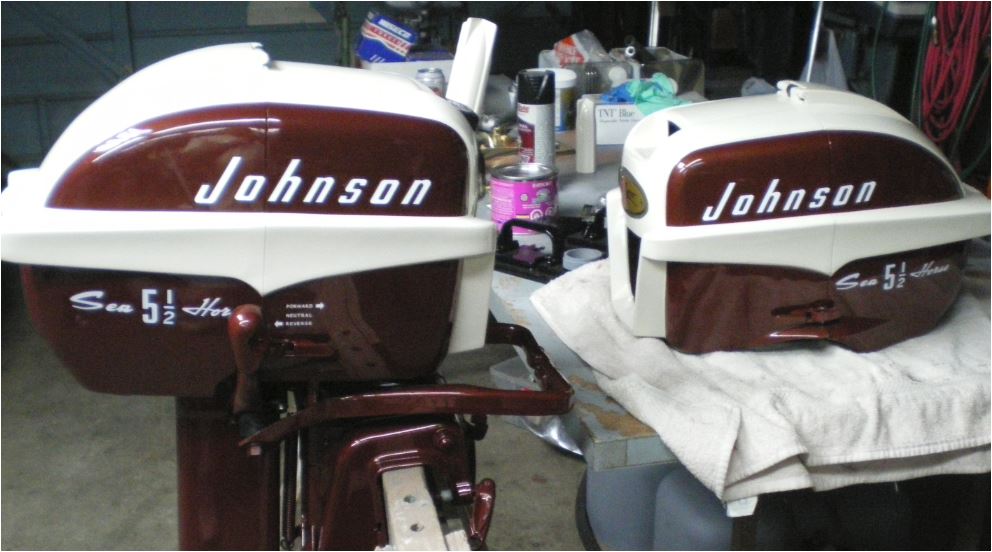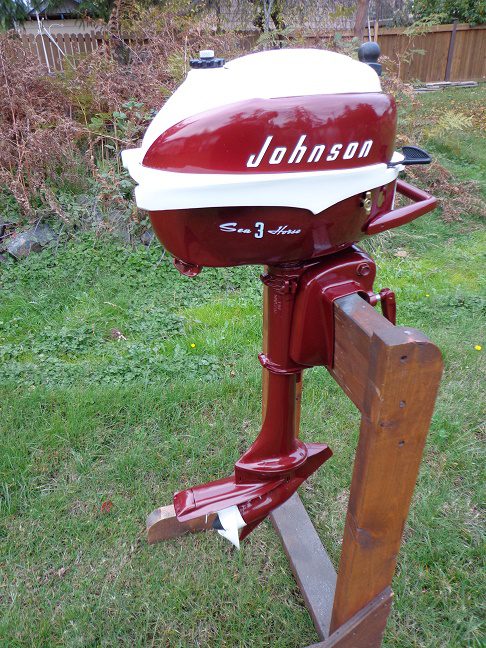Home › Forum › Ask A Member › Painting a 57 Johnson
- This topic has 10 replies, 9 voices, and was last updated 1 month, 2 weeks ago by
 bobw.
bobw.
-
AuthorPosts
-
October 1, 2024 at 6:49 pm #291253
Had a question guys. I’m doing a paint job on a 1957, 18 horse Johnson. It was in such bad shape I had to go ahead and paint it. My question is I’m using paint from vintage outboard and they sell a clearcoat. The 2X clearcoat is fuel proof. What are the pros and cons of putting a clearcoat on the entire motor once I’m done painting it and putting the decals on.? Thanks!!
October 1, 2024 at 9:30 pm #291258I just got done with my second complete restoration—a CD10. I painted the whole thing with rattle cans from vintage outboard paint and then cleared it with Auto Parts store clear. I put on A WHOLE BUNCH of clear, wet sanding with 1000 to 1500 and finally 2000 grit sandpaper in between each coat. The cowl came out awesome, but the midsection spider cracked after a couple of weeks. I put the decals over top of the clear and I like how it turned out. It’s not perfect, far from it, but it’s only my second time doing this. I’ll say that it runs a lot better than it looks! The poor thing had been severely overheated and the pistons were junk, as were the cylinders so I had to cheat and buy a 75 dollar power head off of Fleabay.
Was the clear coat worth it? To me it was, but I like shiny paint jobs. Some will argue that these motors weren’t clear coated from the factory, which may detract from the value / authenticity, etc. I guess it all comes down to preference.
If you’re concerned about the durability of the paint with gasoline, well, I don’t think too many paints can hold up to constant exposure to gasoline. Maybe powder coating is more resistant to gasoline spills, I don’t know. I did spill some gasoline on my mine right below the fuel connector, and it didn’t seem to hurt it, but I cleaned it up right away.
I’m on to my next project (QD16) and I’m taking the paint VERY VERY slowly. Three coats of metal etching primer with wet sanding in between each coat. Then I waited a week before I applied sandable primer. With the sandible primer, also did three coats over the course of a weekend, with wet sanding in between each coat. Now I’m going to let that dry for two weeks before applying color, repeating the same process of wet sanding. Sure, it takes forever, but why rush it? It’s a hobby and meant to be enjoyed 🙂
Rob
1 user thanked author for this post.
October 1, 2024 at 10:10 pm #291260A couple pros of using clearcoat is it protects the underlying color coat and also makes the motor nice and shiny.
A con is the purists will hate it because it isn’t an original finish.
I’m not sure about the durability of rattle can clear but if if you can spray automotive base/clear you’ll end up with a bullet proof finish on your motor. The clear requires an activator mixed in with it to kick it off instead of air drying like spray can paint does. A bit pricy but worth every penny IMHO.

1 user thanked author for this post.
October 2, 2024 at 2:28 pm #291284So beautiful, wish I possessed these skills
October 5, 2024 at 4:59 pm #291365So beautiful, wish I possessed these skills
Hey Don, I would rather have your knowledge of fixing these things, rather than a shiny motor when I’m stuck 3 miles out on the lake!
Bob DOctober 5, 2024 at 7:05 pm #291366I am in the middle of completely restoring my 3rd motor a Johnson k50, the first motor I restored I didn’t use clear coat, and I ended up repainting it and clear coating it because the paint didn’t hold up well. My second motor I clear coated, and it has held up a lot better, the gas spills will still eat through the clear coat I use though if I let it sit/evaporate.
October 5, 2024 at 8:16 pm #291367Tinman it’s not that hard to fix up those old timers! I have had no luck with clear coat. Runs!! Keeping them nice is the hard part!
dale
1 user thanked author for this post.
October 6, 2024 at 2:55 pm #291375The pics of the motors are gorgeous!
I’m wondering how many rattle cans of the Vintage Outboard’s paint it typically takes to restore a motor.
They’re only 12oz cans, so I’m guessing it doesn’t go far. I don’t have the budget right now to spend hundreds on a paint job.
I saw on YouTube that T-Mike uses Rustoleum burgundy and almond on his Johnson restorations.
Have any of you tried Rustoleum or seen a paint job in person?
1956 Johnson 15 Hp, FD-10
1958 Johnson 5.5 Hp, CD-15October 6, 2024 at 10:05 pm #291379I’ve used Rustoleum rattle cans on a couple of motors. It doesn’t produce a super high gloss finish like you would get with a spray rig and high quality automotive paint and clear coat but they are good enough for me. See pics.
Bob
1937 Champion D2C Deluxe Lite Twin
1954 Johnson CD-11
1957 Evinrude Fastwin 18
1958 Johnson QD-19
1958 Johnson FD-12
1959 Johnson QD-20“Every 20 minute job is only a broken bolt away from a 3-day project.”
"Every time you remove a broken or seized bolt an angel gets his wings."1 user thanked author for this post.
October 7, 2024 at 9:50 am #291390Those motors turned out really nice despite not being super shiny. Do you recall if you used Rustoleum Burgundy and Almond colors on the FD-12?
I saw that Rustoleum also has the colors Merlot and Cream, though the Merlot may be discontinued.
I live about a block from an auto-body shop and am thinking it couldn’t hurt to ask what it might cost to match the original colors. It’s probably expensive, otherwise everyone would be doing it.
1956 Johnson 15 Hp, FD-10
1958 Johnson 5.5 Hp, CD-15 -
AuthorPosts
- You must be logged in to reply to this topic.


